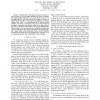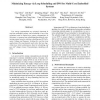174 search results - page 9 / 35 » Determining the Minimum Energy Consumption using Dynamic Vol... |
ICCAD
2004
IEEE
14 years 4 months ago
2004
IEEE
Abstract—The slack time in real-time systems can be used by recovery schemes to increase system reliability as well as by frequency and voltage scaling techniques to save energy....
ICPADS
2005
IEEE
14 years 1 months ago
2005
IEEE
Low energy consumptions are extremely important in real-time embedded systems, and scheduling is one of the techniques used to obtain lower energy consumptions. In this paper, we ...
MICRO
2002
IEEE
13 years 7 months ago
2002
IEEE
On-chip caches represent a sizeable fraction of the total power consumption of microprocessors. Although large caches can significantly improve performance, they have the potentia...
IPPS
2009
IEEE
14 years 2 months ago
2009
IEEE
Power consumption is a very important issue for HPC community, both at the level of one application or at the level of whole workload. Load imbalance of a MPI application can be e...
ASPLOS
2011
ACM
12 years 11 months ago
2011
ACM
Main memory is responsible for a large and increasing fraction of the energy consumed by servers. Prior work has focused on exploiting DRAM low-power states to conserve energy. Ho...


